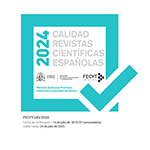Emergency Foster Care: Results and Implications
Abstract
Emergency foster care is a relatively new measure of protection in our country and one that is scarcely studied. The aim of this study is to perform a descriptive analysis of the status of emergency foster care since being put in place in the Province of Malaga. The sample comprised 89 children, 84 biological families and 38 foster families. The instrument used for data collection was the Data Collection Sheet. The findings are the following: a) 59.6 per cent of the children had suffered mistreatment; b) a socio-demographic profile characterized by addiction and psychopathology was found in the biological families; c) the quality and regularity of the parents’ visits to their children was superior to that found in other modalities of foster care; d) foster families had a high number of fostering and had received several children simultaneously; e) 20.3 per cent of the children had been in other previous foster care; f) the average stay in emergency foster care was 5.7 months; and g) 32.4 per cent of children were successfully reintegrated to their biological families after the emergency foster care terms were concluded.
Downloads
Article download
License
In order to support the global exchange of knowledge, the journal Cuadernos de Trabajo Social is allowing unrestricted access to its content as from its publication in this electronic edition, and as such it is an open-access journal. The originals published in this journal are the property of the Complutense University of Madrid and any reproduction thereof in full or in part must cite the source. All content is distributed under a Creative Commons Attribution 4.0 use and distribution licence (CC BY 4.0). This circumstance must be expressly stated in these terms where necessary. You can view the summary and the complete legal text of the licence.









